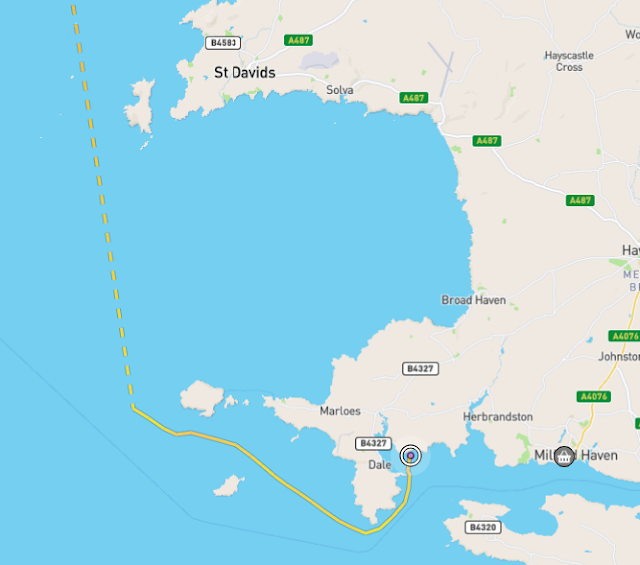After a very peaceful night at anchor off Dale, we roused ourselves with tea and breakfast ready for a 7am departure. The sunrise was pretty impressive and tempted us out:
It even made the distant view of the refineries and commercial docks in Milford Haven look more appealing:
although we doubt that the town itself would look any better. Silk purses and all that.
The anchor played a new game on us as we retrieved it, it would not swing the right way around to be recovered onto the rollers despite having the nice swivel in place. This had worked faultlessly before but now the Rocna had a huge amount of mud and stones on it that were altering the balance of the whole anchor. We (ie the captain, it has to be his fault / responsibility) hadn't bothered to rig up the pressure washdown hose so with the aid of a boathook to swing it round and a very hard-working anchor winch, the Rocna came up together with the mudpack. A clean up job for another day.
Despite leaving at around high water we managed to miss all the commercial traffic and followed the simple route back to Penarth:
It was simple but bumpy. Typically the wind had turned to the east and so we had wind induced waves on the nose. Not stupendously high but they had a very short wavelength meaning the boat pitched up and down nicely. For the non boating folks, short wavelength means that as the boat's bow climbs up and over one wave, it cannot nicely drop down and then rise on the next one. Instead it pretty much lands on top of the next wave, or into the trough of the following one with plenty of up and down motion. The stabilisers take out any roll being induced but you have to live with the pitching which also slows your speed over the ground significantly.
The good news was that as we got into deeper water the wavelength increased a little and plenty of dolphins came to play. Grabbing the camera and trying to take pictures proved tricky as you will see. On this occasion we were too late to capture the guy in the middle of the picture who had dived again but purely by chance got another one in mid air off to the right:
We didn't want to Photoshop these to clean them up - you just get the raw images from the camera so you can laugh at our rather feeble efforts to capture the elegant dolphins.
There was considerable discussion between the folks on board about our ETA at the Cardiff Bay barrage. Thanks to the low rainfall, the bay was only allowing one lock-in per hour and we were aiming for the 8:45pm timeslot. The bumpy time early on had robbed us of quite a bit of speed - the rough calculations and the more scientific one from the navigation PC suggested we were going to miss our planned timeslot. There were two choices really. One was to cram on a bit more power and drive the boat above the economical speed that the hull likes (again, for non boating folks have a look at the internet for information on hull speed or Froude numbers) . The other was to time things to arrive for the lock an hour later. Option two was binned as we wanted to get Simon back to his better half as it was her birthday so we donated some extra diesel to deliver him on time.
Running at 1800 rpm we made up the time nicely and arrived with many other craft for the lock-in. Luckily the first lock was already full and we were the first boat into an empty second lock so we could go starboard side to, our "easy" side. A little LM yacht came in alongside us and Simon recognised it as one he had surveyed previously and so started chatting to the new owners. Proper busman's holiday for him. He even got some more survey work whilst chatting in the lock!
We happily returned to our berth in Penarth although thanks to the low water levels in the bay, it was not easy. The boat handled as though it was moving through glue once inside the marina, getting well and truly "grabbed" by the weed and the effect of the very shallow water.
The trip was about 13.5 hours overall, calmer later on and felt more like a delivery trip than a pleasure cruise. The Bristol channel is not the greatest cruising area but a necessary thing as it takes us to an ideal winter berth location.
Winding down that evening, we saw an article in a sailing magazine talking about the areas around the UK where the tides and geography conspire to make some really rough seas, called races. Here is their graphic:
and for anyone interested, here is a link to their article Yachting monthly. Basically, we went through 4 of them during the trip this summer on the way north but only 2 on the way back. You can work it out if you are very bored. The Lizard and Portland were last summer,
Overall, despite the grim weather up north, we put on about 212 main engine hours and covered around 1450 nautical miles (1670 land miles). Because the weather was so bad, we did a lot less "anchoring off" than we wanted and so the genset had a gentle summer - only 30 hours. Poor ignored thing. It will be busier this winter as it gets used on washing days!
.JPG)

.JPG)

.JPG)
.JPG)









.JPG)

.jpeg)











